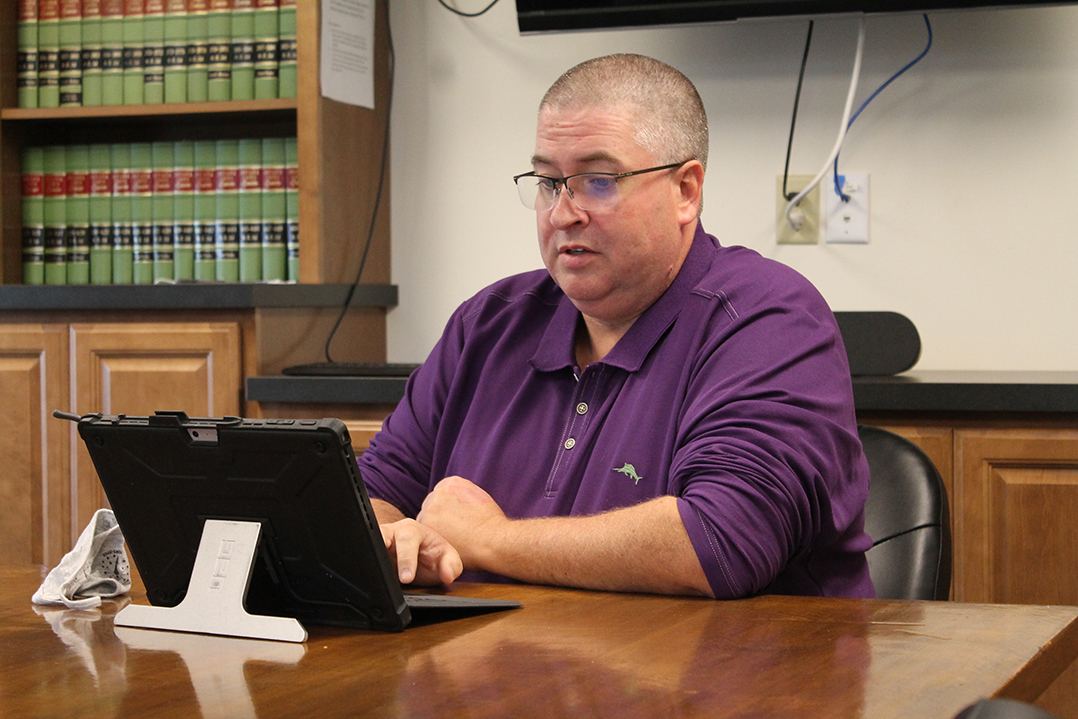Thanks to a national training program, the Boone County Prosecutor’s Office and three county officers have arrested a string of suspects alleged to have viewed or distributed child pornography during a time when such crimes have increased, Boone County Prosecutor Kent Eastwood said.
Boone County now has three officers who have been trained through the Internet Crimes Against Children Task Force Program, a national network of 61 coordinated task forces, representing more than 4,500 federal, state and local law enforcement agencies dedicated to investigating and prosecuting internet crimes against children. They include Lebanon Police Dept. Det. Capt. Amy Dickerson, Boone County Sheriff’s Office Det. Jack Callahan and Whitestown Metropolitan Police Dept. Sgt. Kevin Allen. Callahan works Zionsville ICAC cases, among others, Eastwood said.
The three officers were unable to comment for this story because of federal regulations that prohibit them from talking about their ICAC training.
“Those are specialty officers who first and foremost receive tips on people who may share or possess child pornography,” Eastwood said. “Not a lot of detectives are (members) of ICAC. It’s through the state police.”
Eastwood said the Boone County Prosecutor’s office also is an affiliate member of ICAC, making it one of five in the state.
“Prior to the formation of ICAC and having affiliate members and detectives, these types of cases were primarily investigated by state police,” Eastwood said. “So, if you had tips on people possessing or sharing child pornography, they were the ones who primarily did those types of investigations. By expanding this and our detectives, our investigators and our offices becoming ICAC affiliated, it has opened up our ability to run with these investigations and prosecute them.”
Indiana State Police continue to assist local agencies and detectives with cases involving internet crimes against children, but the training program has now enabled detectives and local agencies to pursue those crimes without relying on help from state police.
State and local task forces that are part of the national program engage in proactive investigations, forensic examinations and prosecutions of internet crimes against children. They also provide forensic, preventive and investigative assistance to parents, educators, prosecutors, law enforcement and others.
“One of the things we are trying to do is not only expand to have more detectives trained in this area but also to expand some of our cyber capabilities,” Eastwood said. “Evidence of this type of crime, whether it is child exploitation or child pornography, it’s all digital. But also evidence in other child molestation cases, a lot of stuff is digital — going through phones, looking at geolocations of people, corroborating people’s accounts of what happened — so expanding those capabilities is extremely important.”
Known digital images of child pornography have a unique hash value, which is like a footprint, Eastwood said, and companies such as Google, Twitter or others “can tell if you have them.” Often, ICAC task forces and police receive tips when an account has images with those specific hash values or shares those images. Police will then investigate who the account or email address associated with the account belongs to. When the account or email address owner is established, a search warrant can be issued, allowing police to confiscate and examine digital devices of the person.
“Prior to having assigned detectives who get this training and know how to do this, we relied on state police, and they are spread too thin,” Eastwood said. “State police did a great job. They were just spread too thin.”
Eastwood believes the program and ICAC-trained officers allow the county to be more active when pursuing such cases.
“Obviously, internet crimes are happening now more than ever before, and when you pair that with Internet Crimes Against Children, we certainly see the need for those cases to be investigated by somebody who has special training and who has a special interest in working those cases,” said Zionsville Police Dept. Lt. Drake Sterling, the department’s public information officer. “I think the unit will be extremely helpful, and I think it is a great move for the local police departments and the prosecutor’s office to team (up) in that effort because it is so vitally important with it becoming more and more prevalent.”
Recent arrests
In recent months, local detectives have received tips that have led to the arrests of several people in possesion of child pornography, a sign that ICAC training has enabled the county to crack down on internet crimes against children, Boone County Prosecutor Kent Eastwood said.
Two such arrests have been of Zionsville men.
On May 12, local law enforcement and the Indiana State Police arrested Steven Kasyjanski, 39, of Zionsville, on two charges of possession of child pornography.
The National Center for Missing and Exploited Children received a cyber tip alleging Kasyjanski had used a social media platform to possess “child exploitative materials,” according to the Boone County Sheriff’s Office. He was a parent coach at the Zionsville Youth Soccer Association.
On May 25, local police arrested then-Zionsville Fire Dept. engineer Daniel Stevens, 47, of Whitestown, on a felony charge of child exploitation/possession of child pornography.
Local police were tipped off by the National Center for Missing and Exploited Children that the user of a Twitter account was uploading child pornography to the social media platform. Investigators from the LPD, WMPD and ZPD and the Internet Crimes Against Children Task Force served search warrants at Stevens’ address and Zionsville Fire Dept. Station 91 after receiving the alert. After a search of the locations, Stevens was arrested.



